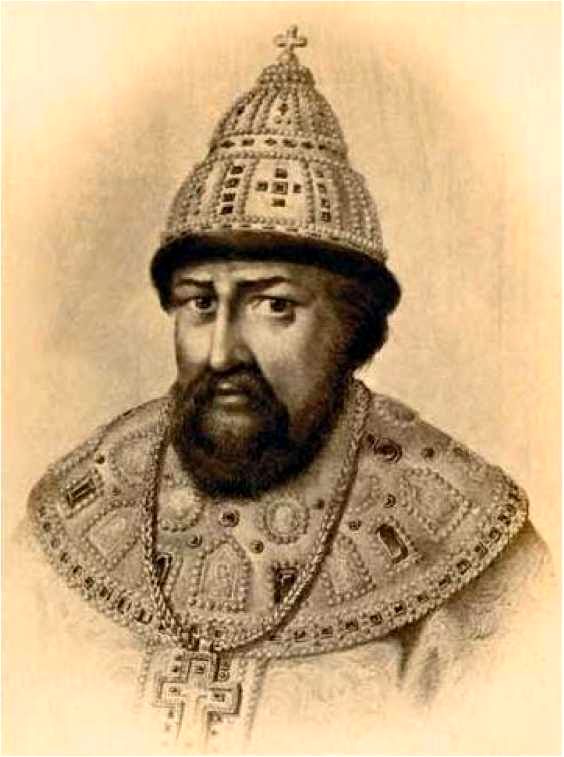Алексей Михайлович Alexis Mikhailovich 1645-1676
Алексей Михайлович Alexis Mikhailovich 1645-1676

Алексей Михайлович вступил на престол после смерти отца, Михаила Романова. Новый царь гордился своими титулами, любил помпезность, стремился к самодержавию, не созывал, как отец, частых Земских соборов. Но при этом он всегда находился под чьим-либо влиянием. А окружение у Алексея Михайловича состояло в основном из людей непорядочных, жадных, берущих взятки. Среди народа росло недовольство, считали, что правят бояре, а не царь. Начали вспыхивать мятежи. Волнения не прекращались в продолжение всего времени правления Алексея Романова. Алексей Михайлович занялся упорядочиванием законодательства.
В 1648 году на Земском соборе утвердили уложение, включающее в себя законы, правила судопроизводства, права сословий. Соборное уложение действовало до 1832 года. Что касается внешней политики, второму Романову удалось закончить войну с Польшей блестящей победой России.
Зимой 1676 года, почувствовав недомогание и близкий конец, царь назначил наследника, велел объявить амнистию и списать узникам казенные долги, и на следующий день скончался.
Alexis ascended the throne on the death of his father, Mikhail Romanov. The new tsar was proud of his titles, he liked pomposity and tended to autocracy, and did not summoned Zemskiy Sobor as often as his father. With all that, he always went under someone’s influence. The milieu of Alexei Mikhailovich consisted mainly of the people dishonest, greedy, prone to bribery. The discontent of the people was growing, they thought that it was not the tsar but the nobles who ruled. The riots started to burst out. The disturbances persisted during the whole reign of Alexis Romanov.
Alexis began to reorder the legislation. In 1648, Zemskiy Sobor approved the Code that included laws and regulations, and stated the legal rights of the society classes. The Code was kept in force until 1832. With regard to foreign policy, the second Romanov managed to stop the war with Poland, by a brilliant victory of Russia.
In winter of 1676, ailing and approaching the end, the tsar appointed his successor, ordered to announce an amnesty and cancellation of the state debts for the prisoners, and on the next day he died.
Более 800 000 книг и аудиокниг! 📚
Получи 2 месяца Литрес Подписки в подарок и наслаждайся неограниченным чтением
ПОЛУЧИТЬ ПОДАРОКДанный текст является ознакомительным фрагментом.
Читайте также
Алексей Михайлович
Алексей Михайлович Алексей Михайлович – второй царь из дома Романовых; род. 19 марта 1629 г., царствовал с 14-го июля 1645 по 28 января 1676 год. До пятилетнего возраста молодой царевич Алексей оставался на попечении у царских «мам». С пяти лет под надзором Б. И. Морозова он стал
Ремизов Алексей Михайлович
Ремизов Алексей Михайлович Ремизов Алексей Михайлович [24.6(6.7).1877, Москва, — 26.11.1957, Париж], русский писатель. Родился в богатой старокупеческой семье. В молодости участвовал в студенческих выступлениях, подвергался репрессиям. Скитался по глухим углам России. Печатался с
АЛЕКСЕЙ МИХАЙЛОВИЧ
АЛЕКСЕЙ МИХАЙЛОВИЧ (1629–1676), русский царь с 1645 г. 159 Делу время и потехе час. Из собственноручной приписки царя в конце вступительной части «Книги, глаголемой урядник: новое уложение и устроение чина сокольничья пути» (1656; печатное изд: 1856). «Час» здесь – синоним «времени»,
БОНДИ, Алексей Михайлович
БОНДИ, Алексей Михайлович (1892–1952), драматург 1265 Я для вас не слишком интеллигентен? Фраза конферансье из «Необыкновенного концерта» – спектакля Центрального театра кукол (1946); сценарий и композиция С. В. Образцова, текст конферанса Бонди, текст отдельных номеров З. Е.
КАЛЕДИН, Алексей Михайлович
КАЛЕДИН, Алексей Михайлович (1861–1918), атаман Донского казачьего войска 12 От болтовни Россия погибла! Слова, сказанные незадолго до самоубийства, 29 янв. 1918 г., при обсуждении вопроса об уходе Добровольческой армии с Дона. В этой форме фраза приводится в «Очерках Русской